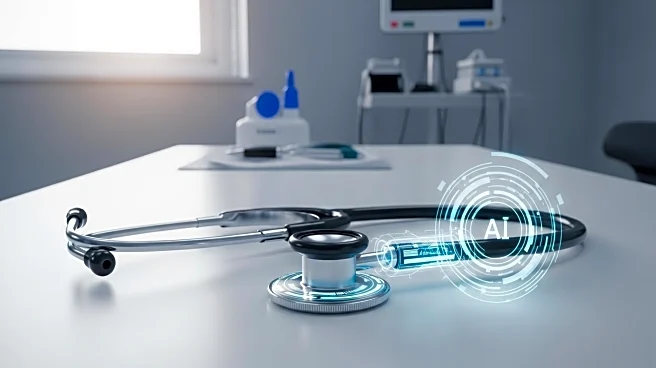What's Happening?
A new AI-powered stethoscope developed by Eko Health is showing promise in detecting heart conditions more efficiently. The device, which replaces the traditional chest piece with a microphone, analyzes subtle differences in heartbeat and blood flow that are undetectable by the human ear. It records an electrocardiogram (ECG) and sends the data to the cloud for analysis by AI trained on extensive patient data. A study conducted by Imperial College London and Imperial College Healthcare NHS Trust involved over 12,000 patients and demonstrated that those examined with the AI stethoscope were significantly more likely to have heart conditions detected within 12 months compared to those examined with traditional methods. The AI stethoscope was found to be 2.33 times more effective in detecting heart failure, 3.5 times more effective in identifying abnormal heart rhythms, and 1.9 times more effective in diagnosing heart valve disease.
Why It's Important?
The introduction of AI stethoscopes could revolutionize the early detection and treatment of heart conditions, potentially reducing the number of emergency hospital visits. Early diagnosis allows patients to receive necessary treatments sooner, improving their quality of life and reducing healthcare costs. This technology represents a significant advancement in precision medicine, offering a modern upgrade to the traditional stethoscope, which has been in use since 1816. The ability to detect conditions like heart failure and abnormal rhythms early can prevent complications such as strokes, thereby saving lives and resources.
What's Next?
Following the successful study, there are plans to roll out the AI stethoscope across the UK, starting with GP practices in south London, Sussex, and Wales. The findings have been presented at the European Society of Cardiology annual congress, indicating a growing interest in integrating AI technologies into healthcare practices. As the device gains wider adoption, it may prompt further research and development in AI applications for other medical diagnostics.
Beyond the Headlines
The use of AI in healthcare raises questions about data privacy and the need for robust cybersecurity measures to protect sensitive patient information. Additionally, the integration of AI tools in medical practice requires training for healthcare professionals to effectively use and interpret AI-generated data. This development also highlights the potential for AI to transform other areas of medical diagnostics, paving the way for more personalized and efficient healthcare solutions.









